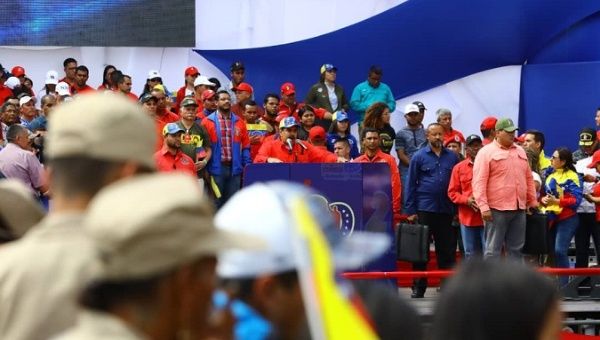The president of Venezuela gave a speech before a crowd in the center of Caracas from the main platform of Bolivar Avenue as Venezuela marked the 20th anniversary of the start of the Bolivarian Revolution and the swearing-in of late President Hugo Chavez.
“How long are they going to hurt the country?” Enough of all the damage they’ve done to our country!” said the Bolivarian leader and invited the opposition to reflect and invited them to abandon the path of interventionism.
“Stop calling the war, stop calling for military intervention, stop supporting a coup that has failed, failed and was not realized, here the revolution is ruling, and we will continue to govern,” he added, according to Telesur.
The president also called for parliamentary elections in order to restore the legislative power, currently in contempt since 2016.
In matters of military defense of the country, Maduro said: “Let it be known that this Bolivarian movement is a deeply rooted force, with a defined and democratic country project, with a people, with the civic-military union. We are a united and powerful force.”
Only path forward in Venezuela is peace and dialogue
He went on to insist that the only path forward is peace and dialogue with the opposition in order to overcome the current political standoff. “Leave the path of Yankee interventionism, stop calling the war, stop supporting a coup that has already failed. The coup failed and they (United States) do not realize it,” he said addressing the right-wing opposition.
“It is time to look for solutions through work, the national union, the productive effort of the whole country. We are not beggars of anyone. Everything we need, we must and can do it in Venezuela.”
The United States was quick to recognize Guaido as “interim president” after he proclaimed himself as such on Jan 23, in violation of the country’s constitution, and Washington’s right-wing allies in the region followed suit in what the elected Venezuelan government of Maduro calls a parliamentary coup.
Since then, the U.S. has approved fresh sanctions against Caracas including economic sanctions against the country’s national oil company. Several senior U.S. officials called on the country’s military to intervene in support of Guaido. However, the country’s military has asserted its support for the constitutional government and rejected calls for a coup.
Under mounting pressure from the Trump administration, Spain and other major countries in the EU have failed to maintain an independent stance on the Venezuelan situation and have said they would be recognizing Guaido as the interim head of state within days but while calling for elections and asking for a peaceful transition.
US Pressured Spain Gov’t to Support US-Backed Coup in Venezuela: El Pais
 The Spanish newspaper El Pais reported Friday that the United States has exerted considerable pressure on the left-leaning government in Spain, led by Prime Minister Pedro Sanchez, in order to come out against the Venezuela president Nicolas Maduro, recognize the opposition lawmaker Juan Guaido as the country “interim president,” and not to endorse or participate in any talks or dialogue between the opposition and the government.
The Spanish newspaper El Pais reported Friday that the United States has exerted considerable pressure on the left-leaning government in Spain, led by Prime Minister Pedro Sanchez, in order to come out against the Venezuela president Nicolas Maduro, recognize the opposition lawmaker Juan Guaido as the country “interim president,” and not to endorse or participate in any talks or dialogue between the opposition and the government.
“We are under a lot of pressure – I won’t tell you from whom but you can figure it out – to vote against the creation of this group,” Foreign Minister José Borrell told El Pais, alluding to an EU-sponsored international contact group meant to foster dialogue in Venezuela.
The newspaper reported that in several meetings ahead of Jan 23, the day Guaido proclaimed himself the interim president, and since, that U.S. diplomats and senior officials placed pressure on counterparts in the Spanish government and other in the European Union to follow the same position as that of the United States and its right-wing allies in Latin America.
In a meeting on Jan. 22, Washington began lobbying Spain in favor of its plans in Venezuela, without specifically revealing Guaido’s plans the next day or Washington’s plan to recognize him immediately
Spain’s secretary of state for Cooperation and Ibero-America Juan Pablo de Laiglesia was in Washington to meet with the assistant secretary for Western Hemisphere Affairs Kimberly Breier where the U.S. officials told the Spanish official that “important events” were expected in Venezuela in the coming days.
A day later and just hours before the Guaido unconstitutional declaration, a call was placed from the U.S. embassy in Madrid, according to El Pais, stating, “It is likely that Guaido will declare himself president today, and we are going to recognize him.”
On Jan. 24, the Spanish foreign minister met with U.S. Ambassador Duke Buchan III, and urged Spain and Portugal to take Guaido’s side because of their ability to shape the position of the rest of the EU on this matter, several sources familiar with the conversation told EL Pais.
“The US diplomat made two demands: for Spain to immediately recognize Guaidó as the legitimate president, and to cut off all dialogue with Maduro,” the newspaper reported.
H.M

